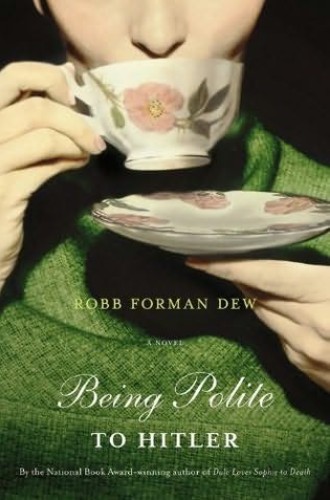Being Polite to Hitler, by Robb Forman Drew
To the fictional Julian Brightman, an obtuse maker of propaganda films for the U.S. government, Washburn, Ohio, is the town "most representative of ordinary life in the United States during what he characterized as the prosperous and serene aftermath of World War II." Here he sets his camera to work to enlighten the world about the lives of ordinary Americans. But in this final novel of Robb Forman Dew's trilogy about the fortunes of the extended Scofield family during the course of the 20th century, Washburn's citizens are anything but serene. What impact, Dew asks, do the large social, political and natural events of our time have on our mundane lives—and what influence can we have on the larger world?
Being Polite to Hitler begins in 1953 on the day when, to the dismay of Agnes Scofield, the novel's central character, the Yankees again win the World Series; when an extended heat wave and drought parch the country's heartland; and when, in Washburn, a young child screams in terror because she mistakes a factory's noonday whistle for an air-raid siren announcing a nuclear attack. That evening, at a dinner party for Robert Butler, the founder of an influential literary review (Dew is the granddaughter of poet John Crowe Ransom, who founded the Kenyon Review at Kenyon College in central Ohio), people argue about the necessity and ethics of dropping the atomic bomb on Hiroshima.
Read our latest issue or browse back issues.
Earlier in the day, Robert's wife, Lily, a seemingly ordinary, cheerful woman in her sixties, roasts a turkey and a ham for the party and muses that "if she allowed herself always to consider everything she knew . . . well, she doubted if she would even bother to get out of bed in the morning." On that day she is especially annoyed by the illustration of the Doomsday Clock that decorates her morning paper. She realizes that "some sort of call to action was implied" but bristles "at being manipulated into feeling responsible for the apparently inevitable use of the atomic bomb."
On the same afternoon, in a house near the University of Chicago, Martyl Langsdorf, the artist who drew the clock (at the request of her husband, Alexander Langsdorf, an atomic scientist), is feeling aggrieved while she tries to put together a meal for the unexpected guests her husband has invited for supper. For both women—one fictitious, the other a historical figure—the mundane and the profound intersect, as they do for all the people in Dew's novel.
Short vignettes of people involved in the momentous events of the 1950s and '60s appear throughout the book. We join Wernher von Braun and his family on the day that Russia launched Sputnik in 1957, and we see the integration of Little Rock's Central High School from the perspective of the students involved. Members of the Scofield family work for the passage of Ohio's Civil Rights Act, and both the fictional and the historical characters who populate the novel react to John F. Kennedy's assassination. When pictures of the mud and chaos of the Woodstock festival flash around the world, the people who grew up with the notion of America depicted in Brightman's films about Washburn have trouble reconciling the two images. This skillful interweaving of the everyday life of Washburn people with the great events and famous people of the time gives the book a substance and depth that take it beyond the realm of domestic fiction.
Dew had to fight her publisher to retain her title for the book, which refers to a central social dilemma articulated by an unhappily married young couple, Claytor and Lavinia Scofield. Several days before Christmas, Claytor deflects with polite humor a boorish neighbor's suggestion that he, a doctor and therefore useful, join the neighbor's family in their bomb shelter in case of atomic war, though there would be no room for his wife and daughters.
Later, at the Garden Club Christmas dance, Lavinia angrily challenges a tablemate who enthusiastically applauds the recent execution of Julius and Ethel Rosenberg, former communists and the parents of two young sons, for allegedly passing nuclear weapons information to the Soviet Union. After the dance, Claytor and Lavinia argue about her outspokenness. She compares not challenging people who say stupid or harmful things to being at a dinner party with Hitler and never dreaming of embarrassing him by "mentioning anything as indelicate as the concentration camps."
Claytor reflects:
Being polite to Hitler was the way the world worked. It was . . . what held society together, how people got through every single day. Everyone he knew—even Lavinia most of the time—held fast to propriety in the face of chaos, desperate etiquette in the face of despair and terror. The difficulty, though, was in realizing those rare occasions when it was, in fact, Hitler to whom you were extending such instinctive courtesy, and therefore it was time, at last, to abandon any niceties at all.
Even the novel's happiest characters, Claytor's mother, Agnes, and her husband, Sam Holloway, can't escape the worry and despair that come with living in a world of so much injustice and suffering. Agnes wrestles with her inability to make things better in the lives of her alcoholic son and his unhappy family. And after the death of four girls in the Birmingham, Alabama, church bombing, soon followed by Kennedy's assassination, Sam, a natural optimist with the ability to make entertaining stories out of the events of his life, is no longer able to indulge himself "in the notion that the reason and goodness and decency of mankind would eventually overcome the consequences of fear and hatred and paranoia."
What do people do when life causes them to lose hope? Here Dew's answer seems to be much like that of Voltaire's Candide: they retreat into cultivating their own gardens. Agnes and Sam increasingly distance themselves from the troubles of their family and the affairs of the world. They spend more and more of their time living quietly on the coast of Maine, building Sam's house and restoring Agnes's cottage. They read, take walks, adopt a dog, meet friends for dinner. They exchange the passion and energy of their earlier lives for simple pleasures and simple kindness. Though this last section is a pleasant read, it seems a comedown from the energy and scope of what has gone before.






